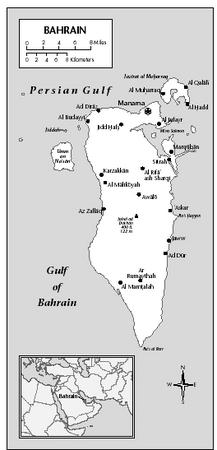Bahrain - Government
Under its constitution, amended 14 Februrary 2002, Bahrain is no longer an emirate but a constitutional monarchy. As a result of the change, the State of Bahrain became the Kingdom of Bahrain, and Sheikh Hamad bin 'Isa al-Khalifa became King Hamad, by his own decree. A referendum held on 14 February 2001 endorsed a return to constitutional rule by 98.4%.
The new legislature is called the National Assembly (Al-Majlis al-Watani). It consists of two houses, an appointed Consultative Council (Majlis al-Shura) and an elected Chamber of Deputies (Majlis al-Nawab). The Chamber of Deputies consists of 40 members, elected for a 4-year term. The Chamber of Deputies elects a president and two vice presidents. The Consultative Council consists of 40 members appointed by the king for a 4-year period. The king also appoints the Council speaker and the Shura Council elects two vice presidents. Both chambers must concur to pass legislation, which is then sent to the king for ratification. The king has the power to dissolve the Chamber of Deputies, but new elections are to be held within four months

from the date of the dissolution; if they are not, the dissolved Chamber reassumes its constitutional powers and is reconvened.
The constitution specifies that Shari'ah is a principal source of legislation but also pledges freedom of conscience. It guarantees equality of women with men "in political, social, cultural and economic spheres, without breaching the provisions of Shari'ah ." The constitution states that every citizen is entitled to health care. It protects private property, but states that "all natural wealth and resources are state property." Discrimination is banned on the basis of sex, national origin, language, religion or creed.
In the first parliamentary elections since 1973, 190 candidates ran for 40 seats in the Chamber of Deputies on 24 October 2002. In nearly half the races, runoff elections were held between the top two vote getters due to close election results. Under the new constitution, women have the right to vote and run for public office. Of the 8 women seeking election in the October parliamentary elections, two forced runoff elections by being among the top two vote getters. As in municipal elections held in May 2002, women constituted over half of those voting. Leaders of Bahrain's Shi'a population and labor-oriented groups called for a boycott of the elections, claiming dissatisfaction with the structure of parliament. Voter turnout was 53.2%. Moderate Sunni Islamists and independents won 16 of 40 seats on 24 October. In a second round held on 31 October, the independents won 12 seats and the Islamists 9. In total, secular representatives or independents secured a total of 21 of the 40 seats, and Islamists 19.
Comment about this article, ask questions, or add new information about this topic: